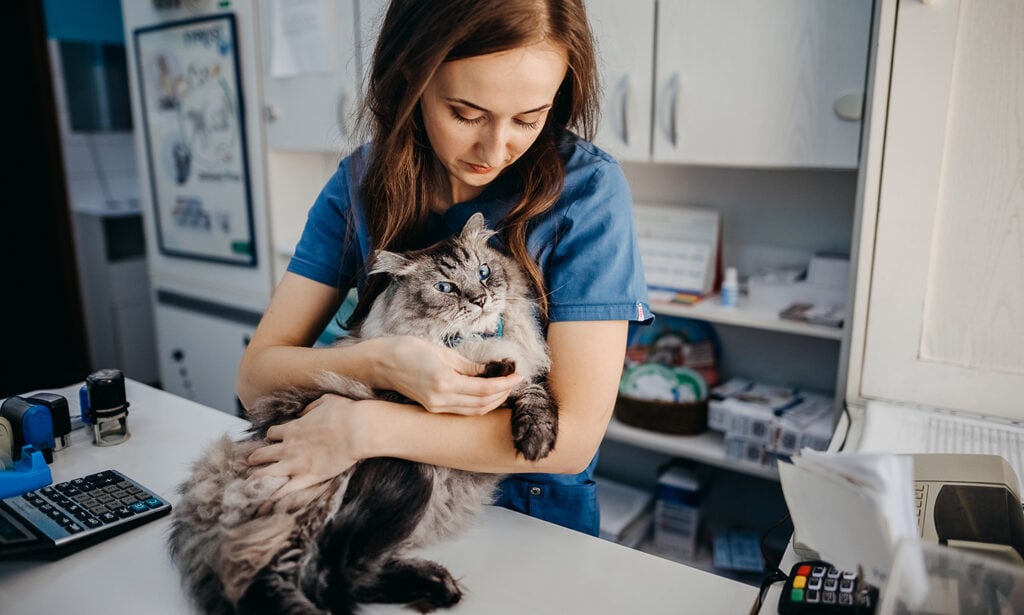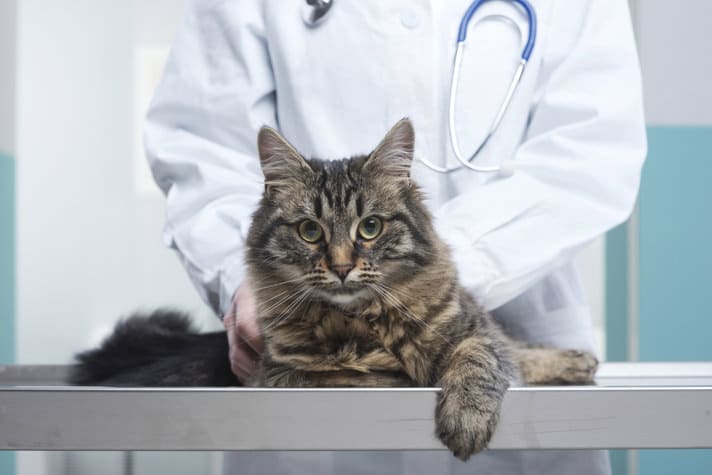In This Guide:
Define Cat Neutering
Technically speaking, neutering means surgically preventing cats from reproducing. Castration (also known as orchiectomy) is the surgical removal of a male cat’s testicles, making him unable to reproduce and also eliminating the main source of his reproductive hormones. Female cats undergo spay surgery (also called ovariohysterectomy), which is the removal of the ovaries, fallopian tubes and uterus, also eliminating the main source of hormones that drive the female’s heat cycle.
A note on terminology: Over time, the terms have morphed so that we use neuter for males and spay for females, which is what we’ll do for the purpose of this article.
How Old Do Cats Need To Be To Get Neutered?
The American Veterinary Medical Association (AVMA), American Association of Feline Practitioners (AAFP) and many cat advocacy groups recommend neutering by 5 months of age. However, some veterinarians say 4 months is fine.
Arnold Plotnick, DVM, former owner of Manhattan Cat Specialists, a feline-exclusive veterinary hospital in New York City, points out that shelters like to neuter early so the cats can be adopted out while they’re still young, as shelters neuter and spay kittens before they are adopted out to decrease cat overpopulation. The standard rule for shelter cats is that the cat has to be at least 8 weeks old and weigh at least 2 pounds. Basically, the kitten needs to be big enough to get through the surgery safely. The AAFP supports early neutering (before cats are sexually mature) as a safe and effective method of decreasing cat overpopulation.
Is it ever too late to neuter? Not really. As long as the cat is healthy, it shouldn’t be a problem. Having said that, Dr. Plotnick says it would be pretty unusual for a middle-aged or elderly cat to show up to a veterinary hospital still intact.
When To Neuter Male Cats
If your kitten or cat hasn’t already been neutered by the shelter, rescue or cat breeder you got him from, get him neutered at least by the time he starts to show signs of sexual maturity. This starts early in the feline world—usually 6 to 10 months, but can be as early as 4 months. Here’s how you’ll know your male cat is showing signs of sexual maturity:
- Seeing testicles. A male cat’s testicles usually become visibly noticeable at around 2 months of age.
- Strong urine smell. The urine of unneutered male cats becomes more potent with a very unpleasant smell.
- Yowling. When looking or calling out for a potential mate, intact males make a distinct—and loud—yowling noise.
- Intact males become extremely territorial of their environment and become more aggressive trying to protect it.
- Along with the newly powerful urine smell, intact males spray their urine in an attempt to mark their territory, even in your house.
- Roaming and wandering. Even indoor-only cats desperately try to get outdoors to find a potential mate.
Unless you’re planning to breed your male cat, there are really no good reasons not to get him neutered, Dr. Plotnick says. There are circumstances that might make cat parents nervous about neuter surgery (like anesthesia risks or health issues), and you should discuss these concerns with your veterinarian.
Benefits of Neutering
Besides curbing overpopulation, cat neutering benefits your cat in a variety of ways, including:
- Health benefits like protection against certain cancers including testicular cancer or enlarged prostate glands
- Decreases aggressive behaviors
- Reduces roaming, which can lead to injuries from being hit by a car or fights with other cats (which, in turn, increases the risk of contracting diseases like FeLV, FIV or cat bite abscesses)
- Eliminates spraying and marking of territory
Where To Get a Cat Neutered
If you’ve adopted your cat from a shelter or rescue organization, chances are he’s already been neutered, which is often part of the adoption fee. If your cat hasn’t been neutered and you already have a veterinarian, they’re your best bet for neuter surgery.
But there are other options, too, especially if you’ve found a stray kitten or care for community cats. Some communities or local shelters offer free or low-cost neuter services. The American Society for the Prevention of Cruelty to Animals (ASPCA) offers information about low-cost spay and neuter programs on its website. A quick internet search for information in your area will also steer you in the right direction.
Cat Neutering Surgery
The thought of your cat having surgery can be daunting, but the neuter procedure is not complicated and is relatively fast. Dr. Plotnick gives us the rundown:
- Cat parents are instructed to withhold their cat’s food and water the night before as well as the morning of the surgery.
- Most veterinarians run some basic blood and urine tests to make sure the cat has no health issues that might rule out (or postpone) surgery. If the tests reveal no health problems, the cat is placed under anesthesia.
- The cat’s scrotum is shaved to remove the hair, then is surgically scrubbed.
- Next, the veterinarian makes an incision into one side of the scrotum and removes the testicle, then makes a similar incision on the other side and removes the remaining testicle.
- Because the scrotal incisions heal quickly, they are not sutured closed—so no sutures or even bandages.
Dr. Plotnick adds that neuters are much less complicated than spays, and the surgical procedure is relatively fast. An experienced veterinarian can neuter a cat in under five minutes. Because the cat is under anesthesia for a very short period of time, recovery from it is usually quick and smooth.
How Much Does It Cost To Neuter a Cat
Prices vary depending on where you live, but in general you can expect to pay anywhere from $60 to $300. You might also be charged a little extra for any pain medications or if your cat requires a recovery cone (more on those below). (The more complicated spay surgery will cost at least $20 or more than neutering by comparison, since it is an internal surgery that requires pre-surgery blood work and anesthesia.)
Having the surgery done at a low-cost clinic can range from about $25 to $75, but these might not include “extras” like pre-anesthesia blood work or intravenous fluids.
If you use pet insurance, double-check to make sure neuter surgery is covered. Some plans cover it as an add-on to a standard policy or part of a wellness plan.
Cat Care After Neutering
In theory, you should try to limit your cat’s activity for five to seven days after the surgery, Dr. Plotnick says. But he admits that cats recover so fast from neutering that trying to enforce “bed rest” is nearly impossible. If your cat goes outdoors, keep him inside for at least a week after surgery.
Elizabethan collars are a good option to keep your cat from licking at the incision, assuming he will tolerate it, of course. Dr. Plotnick says that, in his opinion, wearing a collar for seven days would be ideal, but some kittens are just too wild and playful for a collar. In those cases, he shoots for two days with the collar. Some vets don’t even recommend a collar unless the cat is seen excessively licking at the incision site.
Because recovery time from neuter surgery is pretty short, the only medication that might be needed is a little pain medication for the first few days after surgery, Dr. Plotnick says.
Male Cats Before and After Neutering: What To Expect
If your male cat gets neutered as a kitten, you might not notice a big change in him, as he probably didn’t have a chance to exhibit signs of sexual maturity. However, if your cat is older before his neuter procedure and he’s showing signs of sexual maturity, you might notice the following changes physically and in your cat’s behavior.
Behavior Changes
Because most of the unwanted male behaviors are sexual in nature, you’ll notice these behaviors after neutering.
- Less roaming, as he’s no longer searching for a female cat to mate with
- Less aggression toward other cats, as he doesn’t have to fight off other males for a female’s attention
- Less spraying, as he no longer “needs” to mark his territory
Physical Changes
- More normal urine odor (the urine of an intact male cat is particularly strong and pungent)
- It’s a misconception that male cats become fat and lazy after being neutered. Dr. Plotnick points out that while cats do slow down metabolically after neutering, you can prevent your cat from weight gain by providing an appropriate diet and exercise routine.
Neutering FAQs
Q:What is the difference between cat spaying and cat neutering?
A:Spaying is the surgical removal of a female cat’s reproductive organs (ovaries, fallopian tubes and uterus), while neutering (also called castration) is the surgical removal of a male cat’s testicles.
Q:Can a neutered cat still mate?
A:No. Because a neutered cat cannot produce sperm, he cannot mate. Neutering decreases testosterone levels, so the majority of neutered cats stop showing typical male behaviors like spraying, fighting and sexual behavior, Dr. Plotnick says. That being said, a small number of neutered, male cats might retain some instinctive male behaviors and may interact with other cats in the household in ways that appear sexually aggressive. These cats aren’t actually trying to mate but use this behavior as a way of asserting dominance over the other cat(s) in the household.
Q:What is the best age to neuter a cat?
A:A popular saying in the cat world is Fix by Five—meaning cats should be sterilized at around 5 months of age. There are various factors, of course, like health and weight that affect this, but for the most part 5 months is the perfect age. Cats need to be at least 8 weeks old and weigh at least 2 pounds. Essentially, the cat needs to be big and healthy enough to get through the procedure safely.
Q:How long is recovery from cat neutering?
A:As far as anesthesia, it usually takes a few hours for the cat to wake up and 12 to 24 hours for it to leave his system completely. Post-surgery, it typically takes about five to seven days for your cat to completely recover. Mild side effects like lethargy and loss of appetite are normal. Try to keep running and jumping to a minimum (good luck!), and keep an eye on the incision site and any worsening symptoms.
Q:Is it painful for cats to be neutered?
A:Dr. Plotnick says there’s always some degree of pain when surgery is involved but notes that neutering is one of the less painful surgeries. Kittens, especially, behave as if nothing was ever done to them, even just a few hours after surgery. But still, Dr. Plotnick says that most veterinarians should (and do) prescribe some pain medication for the first few days after surgery.
Talk to Your Veterinarian
Every cat is an individual and will respond to their neuter surgery differently. If you have any concerns about your cat’s procedure, medications or what to expect during recovery, talk to your veterinarian.
After Cat Neutering
Expert input provided by Arnold Plotnick, DVM, former owner of Manhattan Cat Specialists, a feline-exclusive veterinary hospital in New York City.
This content was medically reviewed by a veterinarian.
More about caring for cats:
Share:












